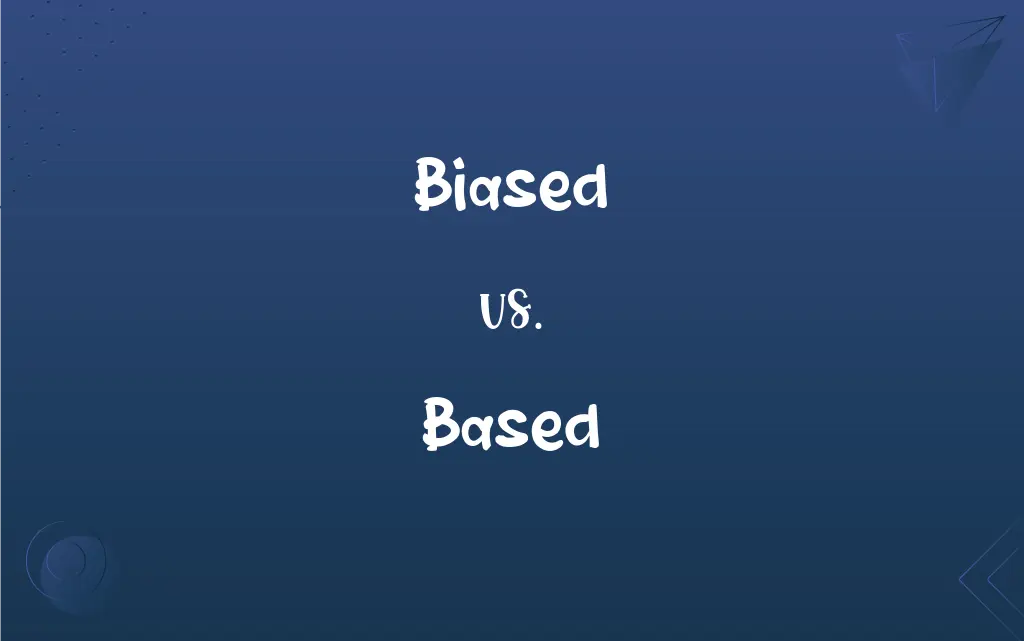Biased vs. Based: What's the Difference?
By Harlon Moss || Updated on May 24, 2024
"Biased" means showing an unfair preference or prejudice, while "based" means something is founded on or rooted in a particular idea or fact.

Key Differences
"Biased" refers to an inclination or prejudice for or against something or someone, often resulting in unfair judgment. It implies a lack of neutrality and objectivity. "Based," on the other hand, indicates that something is grounded or established on certain principles, facts, or foundations, showing a source or reason behind it.
"Biased" can negatively impact decision-making and judgment, as it stems from personal preferences or prejudices. "Based," conversely, conveys that something is built upon solid grounds or supported by evidence, suggesting reliability and rationality.
"Biased" is often used in contexts involving opinions, judgments, and perspectives, indicating partiality. "Based" is used to show the origin, foundation, or support of an idea, action, or belief, emphasizing its legitimacy or reason.
In communication, identifying "biased" statements helps recognize potential unfairness or skewed views, while understanding "based" statements helps appreciate the underlying rationale or justification.
Comparison Chart
Definition
Showing unfair preference or prejudice
Founded on or rooted in an idea or fact
ADVERTISEMENT
Implication
Lack of neutrality and objectivity
Grounded in principles, facts, or evidence
Impact
Can negatively affect judgment and decisions
Suggests reliability and rationality
Usage Context
Opinions, judgments, and perspectives
Foundation or support of ideas or actions
Communication
Indicates partiality
Emphasizes legitimacy or reason
Biased and Based Definitions
Biased
Showing unfair prejudice in favor of or against something.
The judge was biased, favoring the defendant from the start.
ADVERTISEMENT
Based
Rooted or founded on specific principles or facts.
Her argument was based on thorough research.
Biased
Exhibiting partiality or favoritism.
The referee was accused of biased officiating.
Based
Grounded in reality or practicality.
The plan is based on realistic projections.
Biased
Lacking neutrality in judgment.
The article was biased, presenting only one side of the story.
Based
The lowest or bottom part
The base of a cliff.
The base of a lamp.
Biased
Inclined towards a particular outcome unfairly.
His biased opinion affected the team's decision.
Based
The part of a plant or animal organ that is nearest to its point of attachment.
Biased
Influenced by personal feelings rather than facts.
Her review was biased because she dislikes the author.
Based
The point of attachment of such an organ.
Biased
Marked by or exhibiting bias; prejudiced
Gave a biased account of the trial.
Based
A supporting part or layer; a foundation
A skyscraper built on a base of solid rock.
Biased
Exhibiting bias; prejudiced.
The newspaper gave a biased account of the incident.
Based
A basic or underlying element; infrastructure
The nation's industrial base.
Biased
Angled at a slant.
The table had a biased edge.
Based
The fundamental principle or underlying concept of a system or theory; a basis.
Biased
(electrical engineering) On which an electrical bias is applied.
Based
A fundamental ingredient; a chief constituent
A paint with an oil base.
Biased
(statistics) Exhibiting a systematic distortion of results due to a factor not allowed for in its derivation; skewed.
Based
The fact, observation, or premise from which a reasoning process is begun.
Biased
Simple past tense and past participle of bias
She biased them against him for no apparent reason.
Based
(Games) A starting point, safety area, or goal.
Biased
Favoring one person or side over another;
A biased account of the trial
A decision that was partial to the defendant
Based
(Baseball) Any one of the four corners of an infield, marked by a bag or plate, that must be touched by a runner before a run can be scored.
Biased
Excessively devoted to one faction
Based
A center of organization, supply, or activity; a headquarters.
Based
The portion of a social organization, especially a political party, consisting of the most dedicated or motivated members.
Based
A fortified center of operations.
Based
A supply center for a large force of military personnel.
Based
A facial cosmetic used to even out the complexion or provide a surface for other makeup; a foundation.
Based
(Architecture) The lowest part of a structure, such as a wall, considered as a separate unit
The base of a column.
Based
(Heraldry) The lower part of a shield.
Based
(Linguistics) A morpheme or morphemes regarded as a form to which affixes or other bases may be added.
Based
The side or face of a geometric figure to which an altitude is or is thought to be drawn.
Based
The number that is raised to various powers to generate the principal counting units of a number system. The base of the decimal system, for example, is 10.
Based
The number raised to the logarithm of a designated number in order to produce that designated number; the number at which a chosen logarithmic scale has the value 1.
Based
A line used as a reference for measurement or computations.
Based
Any of a class of compounds whose aqueous solutions are characterized by a bitter taste, a slippery feel, the ability to turn litmus blue, and the ability to react with acids to form salts.
Based
A substance that yields hydroxide ions when dissolved in water.
Based
A substance that can act as a proton acceptor.
Based
A substance that can donate a pair of electrons to form a covalent bond.
Based
The region in a transistor between the emitter and the collector.
Based
The electrode attached to this region.
Based
One of the nitrogen-containing purines (adenine and guanine) or pyrimidines (cytosine, thymine, and uracil) that occurs attached to the sugar component of DNA or RNA.
Based
Forming or serving as a base
A base layer of soil.
Based
Situated at or near the base or bottom
A base camp for the mountain climbers.
Based
(Chemistry) Of, relating to, or containing a base.
Based
To form or provide a base for
Based the new company in Portland.
Based
To find a basis for; establish
Based her conclusions on the report.
A film based on a best-selling novel.
Based
To assign to a base; station
Troops based in the Middle East.
Based
Founded on; having a basis; often used in combining forms.
That was a soundly based argument.
Based
Not caring what others think about one's personality, style, or behavior; focused on maintaining individuality.
Based
Admirable; praiseworthy.
OP is based as hell
Based
Admirable for rejecting liberalism or left-wing values.
Based and redpilled
My last account got banned for being too based.
Based
Simple past tense and past participle of base
Based
Being derived from (usually followed by on or upon).
It's a new film based on a best-selling novel.
Based
Having a base
The ladder is based on the even sidewalk for stability.
Based
Having a base of operations.
The company is based in New York.
Based
Indicating emphatic approval of a statement or opinion.
—There is no ethical consumption under capitalism. —Based.
Based
Having a base, or having as a base; supported; as, broad-based.
Based
Wearing, or protected by, bases.
Based
Being derived from (usually followed by `on' or `upon');
A film based on a best-selling novel
Based
Having a base;
Firmly based ice
Based
Having a basis; often used as combining terms;
A soundly based argument
Well-founded suspicions
Based
Having a base of operations;
A company based in Atlanta
Based
Established on a particular idea or fact.
The policy is based on recent economic data.
Based
Supported by evidence or reason.
His conclusion was based on scientific findings.
Based
Originating from a specific source or foundation.
The decision was based on the company's guidelines.
FAQs
Can "biased" have positive connotations?
Generally, "biased" has negative connotations, implying unfairness.
How can one identify a biased opinion?
A biased opinion shows partiality and lacks objectivity, often favoring one side unfairly.
Is "based" always factual?
"Based" implies being founded on facts or solid principles, suggesting reliability.
What does "based" mean?
"Based" means something is founded on or rooted in an idea or fact.
What does "biased" mean?
"Biased" means showing an unfair preference or prejudice.
What are common sources of bias?
Common sources of bias include personal beliefs, cultural influences, and selective information.
Can "based" imply opinion?
"Based" can imply an opinion if it is supported by evidence or logical reasoning.
Can "based" be used in creative contexts?
Yes, "based" can describe creative works that draw inspiration from real events or facts.
Is it possible for a study to be unbiased?
While complete objectivity is challenging, rigorous methodologies can minimize bias in studies.
Why is it important to recognize biased information?
Recognizing biased information helps ensure fair and balanced understanding.
How does "based" contribute to credibility?
"Based" suggests that something is grounded in reliable sources, enhancing credibility.
Can a statement be both biased and based?
A statement can be based on facts but still be biased if it selectively presents information.
Is bias always intentional?
Bias can be both intentional and unintentional, influenced by personal experiences or beliefs.
How do biases affect decision-making?
Biases can lead to unfair or skewed decisions by influencing judgment.
Can a fact be biased?
Facts themselves are neutral, but their presentation or interpretation can be biased.
How does "based" enhance clarity in communication?
"Based" enhances clarity by clearly indicating the foundation or rationale behind statements.
Why is being based important in research?
Being based ensures that research findings are grounded in evidence and sound methodology.
How can one avoid being biased?
To avoid bias, seek diverse perspectives, rely on factual information, and remain open-minded.
What role does bias play in media?
Bias in media can shape public perception by presenting information in a skewed manner.
Why is it crucial to have a based foundation in arguments?
A based foundation ensures arguments are logical, credible, and persuasive.
About Author
Written by
Harlon MossHarlon is a seasoned quality moderator and accomplished content writer for Difference Wiki. An alumnus of the prestigious University of California, he earned his degree in Computer Science. Leveraging his academic background, Harlon brings a meticulous and informed perspective to his work, ensuring content accuracy and excellence.































































